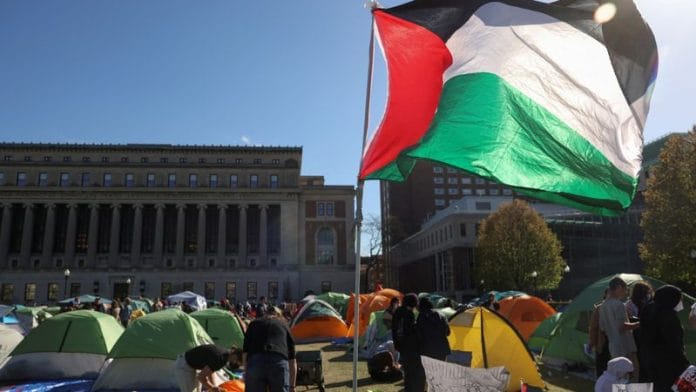pro-Palestine protests are sweeping college campuses across the United States amid the ongoing Israel-Hamas crisis, sparked by Hamas’ 7 October 7. The demonstrations have gained fervour, with the protesters demanding an immediate ceasefire, fiercely criticising Israel’s assault on Gaza with the US’ military and financial backing.
Students want colleges to boycott organisations and institutions that are funding Israel, which puts administrators in a tricky position. Meanwhile, these protesters are accused of inciting anti-Semitism, with some Jewish students alleging facing anti-Semitism on campus, making it more complicated to take a side.
Much has been said and written in international media as news platforms have extensively covered the spreading protests, now gaining momentum across Europe. However, the pro-Palestine demonstrations have forced Western authorities to use extreme tactics, such as sending riot police to break up protesters’ camps and take them into custody. The administration characterises the protests as anti-Semitic and labels the demonstrators as “professional agitators,” defending these measures as necessary to preserve public order.
The United States prides itself on its commitment to freedom of speech, where citizens can express their ideas and opinions without fear of government retaliation. However, there is a sudden realisation that organised protests driven by interest groups exist. This begs the question of why protests are viewed and treated inconsistently, especially in light of the West’s criticism of other countries—like India—for restricting free speech in response to protests of a similar nature.
West’s hypocrisy
The hypocrisy of the West becomes glaringly evident when we observe their response to the Indian state taking actions on JNU protests condemning the hanging of a known separatist. The coverage in western media of the February 2016 protest at JNU, which commemorated the hanging of Afzal Guru, a convict of the Parliament terror attack, shows double standard. This incident was portrayed by international media as an expression of dissent being stifled.
Similarly, Umar Khalid, who glorified Hizbul Mujahideen commander Burhan Wani in a deleted Facebook post, was hailed in Western media as a champion of democracy and a victim of the Indian state. Today, we see that even President Joe Biden said in his speech, “But dissent must never lead to disorder”, and western media is echoing the same narrative as the authorities. Ironically, this mirrors what the US condemned as the suppression of “freedom of speech and the right to protest” when Indian authorities cracked down on what the state perceived as organised protests
To understand the depth of bias against India or the lack of understanding of ground reality in India, one only needs to examine the headlines from Western media covering the protests in colleges of both countries. While protesting at JNU, The Washington Post‘s headline read, “Indian students called it free speech. The government called it sedition.” Meanwhile, the BBC‘s headline stated, “JNU: Students across India protest against campus attack.” However, when it came to protests at Columbia University, the BBC supported the US government with its headline, “Columbia protesters take over the building after defying deadline.” In similar fashion, The Washington Post‘s headline goes, “How a Columbia protest sparked a student revolt.”
Interestingly, authorities were not accused of employing brute force, despite videos emerging from campuses showing the disproportionate use of force by riot police against peaceful protesters or curtailing of dissent voices, or the worrying situation where democracy is being undermined. This contradiction highlights the inconsistency in how similar situations are perceived and addressed based on geopolitical interests.
JNU has harboured a faction of ultra-Leftists who have consistently celebrated ‘anti-Indian’ forces, including the questionable protest following the massacre of 76 CRPF soldiers by Maoists in 2010, when the entire nation was in mourning. That incident even brought the usually opposing student factions of NSUI and ABVP together.
The recent actions taken by the Indian state to address student protests and gatherings within the bounds of the law have been criticised by the West as attacks on dissent. This stands in stark contrast to the treatment given to similar situations in Western universities, where even instances that aren’t as provocative as supporting anti-US elements are not granted the same privilege or understanding.
Amana Begam Ansari is a columnist and TV news panelist. She runs a weekly YouTube show called ‘India This Week by Amana and Khalid’. She tweets @Amana_Ansari. Views are personal.
(Edited by Prashant)






